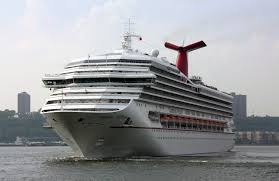
Persistent macroeconomic headwinds and soaring recessionary concerns have slowed down consumer discretionary spending, which includes travel. Amid such a scenario, the cruise line industry could be under significant pressure. Given this backdrop, Royal Caribbean Cruises Ltd. (RCL) and Carnival Corporation & plc (CCL) could be avoided in 2023 for reasons mentioned throughout the article.
Although consumer prices rose 6% annually, well below the 9.1% peak in June 2022, inflation remains far above the Fed’s target range of 2%. The inflation pressure remains anchored in much of the economy and is still a cause of concern for some Americans.
Furthermore, the Fed’s persistent rate hikes are expected to hit a target range of 5.5%-5.75%, compared to the current 4.5%-4.75% and well above the market pricing of 4.75%-5%, as per Citigroup (C).
Americans cut down on their spending last month. U.S. retail sales fell 0.4% in February from the prior month. The demand for leisure travel, one of the discretionary spending, will likely take a hit in 2023. Cruise companies are piling up fresh debt through their investments in new ships. This could lead them to face significant challenges while recovering.
Therefore, fundamentally weak cruise line stocks RCL and CCL could be avoided in 2023.
Royal Caribbean Cruises Ltd. (RCL)
RCL operates cruises under the Royal Caribbean International, Celebrity Cruises, Azamara, and Silversea Cruises brands, which comprise a range of itineraries that call on approximately 1,000 destinations.
RCL’s forward non-GAAP P/E of 18.33x is 33.2% higher than the industry average of 13.76x. Its forward EV/Sales multiple of 2.93 is 160.4% higher than the industry average of 1.13x.
RCL’s trailing-12-month gross profit margin of 26.87% is 23.2% lower than the industry average of 34.99%. Its trailing-12-month net income margin of negative 24.39% compares to the 4.57% industry average.
On February 8, RCL announced the commencement of a private offering of $700 million aggregate principal amount of senior guaranteed notes due 2030.
RCL’s total cruise operating expenses increased 57% year-over-year to $1.78 billion during the fourth quarter that ended December 31, 2022. The company’s adjusted net loss came in at $284.87 million, and the adjusted net loss per share stood at $1.12. Its total current liabilities stood at $8.57 billion as of December 31, 2022, compared to $7.29 billion as of December 31, 2021.
Analysts expect RCL’s EPS to be negative $0.70 for the current fiscal quarter ending March 2023. Its revenue is expected to be $2.82 billion for the same quarter.
The stock has declined 13% over the past year and 12.2% over the past month to close its last trading session at $64.87.
RCL’s POWR Ratings reflect this bleak outlook. The stock has an overall D rating, equating to Sell in our proprietary rating system. The POWR Ratings assess stocks by 118 different factors, each with its own weighting.
RCL is also graded a D in Value, Stability, and Quality. It is ranked #2 out of 4 stocks in the F-rated Travel – Cruises industry.
In addition to the POWR Rating grades we’ve stated above, RCL’s rating for Growth, Momentum, and Sentiment can be seen here.
Carnival Corporation & plc (CCL)
CCL engages in the provision of leisure travel services. The company operates a fleet of more than 90 ships that visit approximately 700 ports under AIDA Cruises, Carnival Cruise Line, Costa Cruises, Cunard, Holland America Line, Princess Cruises, P&O Cruises (Australia), P&O Cruises (UK), and Seabourn brand names.
CCL’s forward EV/Sales of 2.04x is 80.5% higher than the industry average of 1.13x. Its forward EV/EBIT multiple of 23.23 is 82.1% higher than the industry average of 12.76.
CCL’s trailing-12-month gross profit margin of 31.31% is 10.5% lower than the industry average of 34.99%. Its trailing-12-month net income margin is negative 50.07% compared to the 4.57% industry average.
During the fiscal fourth quarter that ended November 30, 2022, CCL’s operating costs and expenses widened 56.4% year-over-year to $4.97 billion. Its adjusted net loss came in at $1.07 billion. The company reported an adjusted loss per share of $0.85.
CCL’s revenue is expected to be $4.83 billion in the fiscal second quarter ending May 2023. Its EPS is expected to be negative $0.27 for the same quarter. Also, the stock has failed to surpass the revenue estimates in each of the trailing four quarters.
The stock has plunged 53.3% over the past year to close the last trading session at $9.03. It also declined 22.2% over the past month.
It’s no surprise that CCL has an overall rating of D, which translates to Sell in our POWR Ratings system.
The stock also has an F grade for Stability and Quality. It is ranked #3 in the same industry.
Click here to see the POWR Ratings of CCL (Growth, Value, Momentum, and Sentiment).
What To Do Next?
Get your hands on this special report:
What gives these stocks the right stuff to become big winners, even in this brutal stock market?
First, because they are all low-priced companies with the most upside potential in today’s volatile markets.
But even more important is that they are all top Buy rated stocks according to our coveted POWR Ratings system, and they excel in key areas of growth, sentiment and momentum.
Click below now to see these 3 exciting stocks that could double or more in the year ahead.
RCL shares were trading at $62.59 per share on Friday afternoon, down $2.28 (-3.51%). Year-to-date, RCL has gained 26.62%, versus a 2.25% rise in the benchmark S&P 500 index during the same period.
About the Author: Sristi Suman Jayaswal

The stock market dynamics sparked Sristi's interest during her school days, which led her to become a financial journalist. Investing in undervalued stocks with solid long-term growth prospects is her preferred strategy. Having earned a master's degree in Accounting and Finance, Sristi hopes to deepen her investment research experience and better guide investors.
Don't Get Trapped Owning These 2 Cruise Line Stocks in 2023 StockNews.com









